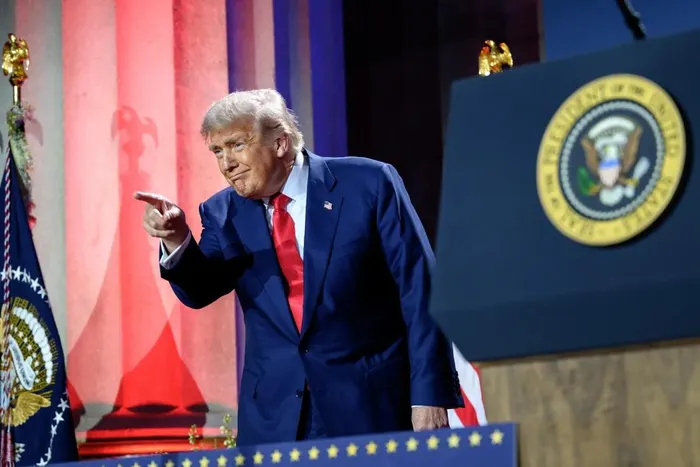Understanding the economic consequences of Trump's tariffs for South Africa

US President Donald Trump's tariffs could slash South Africa's economic growth to 0.3% for the year.
Image: The White House
A complete halt in trade from South Africa to the US would have devastating consequences for hundreds of thousands of people whose jobs depend on that trade, while stripping almost $2.9 billion (R52bn) in value from the economy.
While it is unlikely that exports of South African goods to the US will stop entirely from tomorrow, when US President Donald Trump’s 30% trade tariff is highly likely to come into effect, the economic impact will be significant.
The effects are already visible. The rand has weakened, with Andre Cilliers, currency strategist at TreasuryONE, saying on Thursday morning that the currency is under pressure from both a stronger dollar and the looming 30% tariffs on South African exports to the US.
Cilliers added that the local currency was also being pushed down by the South African Reserve Bank’s decision, expected later today, to cut interest rates by 0.25 percentage points, taking the prime lending rate to 10.5% – offering some relief.
By 09.30am, the rand had breached the R18 to the dollar mark after holding at around R17.90 for several days. Investec chief economist Annabel Bishop said the slump was directly linked to tariff uncertainty.
The only optimistic economist polled by IOL Business was Old Mutual chief economist Johann Els, who still sees the rand settling between R16 and R16.99 despite the tariffs – although it won’t reach this level immediately.
The tariffs will add roughly $3.5 billion (R63bn) to the cost of exports to the US, based on South Africa’s 2023 export value. Key exports include mineral resources (platinum and gold, which are excluded from the tariffs), agricultural products (citrus fruits, wine, processed foods), and manufactured goods such as automobiles.
Gross domestic product (GDP) will also take a hit. Nolan Wapenaar, co-chief investment officer at Anchor Capital, said “economists are all modelling to estimate the impact and, from what I am seeing, this will shave about 0.7% off economic growth. Just not nice.”
This would reduce economic growth to 0.3% for the year, down from an already weak 0.1% in the first quarter.
On Tuesday, the International Monetary Fund’s latest World Economic Outlook optimistically projected South Africa’s economy to grow 1% this year, noting that global growth is expected to slow as recent trade disruptions take effect.
Donald MacKay, CEO of XA Global Trade Advisors, has said that the tariffs in place – and those expected – affect about 1.3% of South Africa’s GDP. “That doesn't mean it's going to move the GDP down by 1.3%, but that is the portion of our GDP that has the potential to shift,” he said.
MacKay told IOL Business “the ability to quantify this, there are just far too many things that we just don't know. The job losses, the simple answer is I don't know.” He added “the two sectors that are labour-intensive and will take pain are the citrus growers and the table grapes. So, cars are not impacted by this, because cars already have a 25% tariff.”
In 2023, exports to the US accounted for around 2.2% of GDP, while approximately 426 000 jobs were linked to exports to that market. ActionSA president Herman Mashaba said the agricultural and automotive export market to the US alone employs more than 100 000 South Africans.
Even with platinum and gold excluded from tariffs, hundreds of thousands of jobs are at risk in a country where millions are unemployed. The official unemployment rate was 32.9% in the first quarter of the year.
In a worst-case scenario, unemployment could rise sharply, with the number of jobless South Africans increasing from 16.4 million to 16.8 million out of a potential workforce of 25 million – an official unemployment rate of 34.4%. For context, the worst unemployment rate since democratic elections was in the fourth quarter of 2021 at 35.03%.
Meanwhile, the chances of a deal with the US are diminishing. South Africa has already begun seeking alternative trade partners within Africa. Earlier this week, Trade, Industry and Competition Minister Parks Tau attempted to calm fears, saying South Africa was still pursuing an agreement.
“Our view is that negotiations remain the best tool to deal with the issues that are on the table,” Tau said in a statement. He added that South Africa had made several offers to the US, including importing Liquified Natural Gas for 10 years, unlocking $12 billion.
Tau also said South Africa would simplify poultry imports and provide “open market access for blueberries subject to necessary protocols”.
MacKay, however, called for greater transparency. “We need the government to be a little bit more transparent and tell us what is actually going on, what the offers look like precisely. And without that kind of detail, then all I've got to say is the media release tells us absolutely nothing of value.”
Tau has conceded that “a reset” in trade relations between the two countries is “unavoidable”.
IOL
Related Topics: